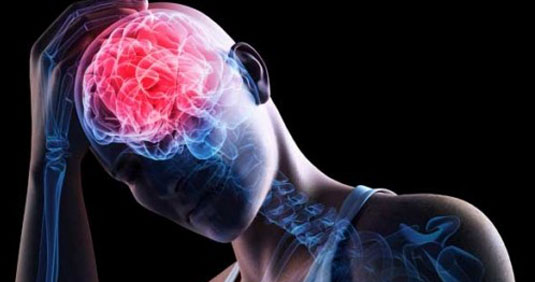Early one morning last February I turned over in my sleep, and rolled off the side of my lofted bunk, my head colliding with the corner of the adjacent dresser on my way to the floor. I woke up slightly dazed, with a searing pain crossing the top of my forehead. After some minutes of howling and clutching my injured skull, the pain subsided and I went back to sleep, thinking that was the end of it. I couldn’t have been more wrong.
I had never suffered a concussion before last February, and like most people I did not have a particularly thorough understanding of the injury. A concussion (mild traumatic brain injury) occurs when direct impact or violent shaking of the head causes the brain to collide with the skull walls, often resulting in shearing of neural fibers. For me, the damage to my brain tissue manifested in an array of unpleasant symptoms — migraines, a nauseating sense of vertigo, difficulty thinking and, more than anything else, an extreme inability to tolerate almost any level of sound or light.
Just days after my injury I noticed the tendency of my peers, professors and even medical specialists to understate both the severity of concussions and the difficulty of the recovery process.
The first neurologist I visited advised me that though my symptoms were unpleasant, they would not persist. He prescribed me a migraine medication and assigned me to a dark room with no stimulation for the rest of the week. I was told I would have no trouble returning to classes in five days.
Members of Occidental’s student support staff informed me that school protocol typically allows concussed students just one week off from classes. Some of my professors also expressed that they expected to see me back within this time-frame.
Despite the negative press surrounding football and its associated head injury issues of late, a fundamental lack of understanding concerning concussions remains pervasive, both within the medical community and the general population. In categorizing my injury as a week-long ailment, my neurologist only echoed the widely-held view of concussions: bump your head, spend a view days lying in a dark room and then return to life as normal.
For sufferers of mild traumatic brain injury, the reality is often far different.
Concussions frequently take as long as four months to fully heal. For individuals with Post-Concussion Syndrome, symptoms may persist for up to a year, or in some cases longer.
My symptoms remained relatively constant for the entirety of the spring semester. After weeks of intermittent bed-rest, I tried to resume my classes and social interactions, but any overhead lighting felt like it was burning through my head, and even normal conversation stung my ears like nails on a chalk-board. As the semester continued I withdrew more and more, gradually falling into a deep depression.
The invalidation I received from many of the people around me only further hindered my recovery. Peers I talked to about my injury proposed that my ailment just didn’t sound like concussion, because my issues would have already resolved. Others gently hinted that I might just be imagining my symptoms, by reminding me of my anxiety-prone mind. Some of my male friends suggested that I was “just being a p—y” — especially when I refused to drink alcohol. Even my neurologist seemed skeptical that I was really still experiencing such debilitating symptoms.
Increasingly doubting my brain’s ability to heal, I fell deeper into a spiral of despondency, self-doubt and anxiety. The feelings of despair compounded my concussion symptoms throughout the spring and summer, until finally, in early September, I began to feel more like myself.
Now 10 months removed from my injury, I continue to meet people at school who share my experience — individuals who endured concussive symptoms for as long as a year and were made to feel like liars, hypochondriacs or attention-seekers along the way.
The dismissive attitudes that many continue to hold toward concussions makes an already arduous recovery process that much more difficult. Students, athletes, faculty and even medical professionals need to further educate themselves on the nuances of concussions. In doing so they can help prevent brain injuries, improve treatment practices and provide comfort and support for long-term sufferers who must continually struggle with an invisible ailment.
We must also erode the foundations of toxic masculinity, a narrative that pressures men to participate in violent sports and then disparages them for sitting out after a head injury. It becomes clear when we look at the link between concussions and permanent brain damage that men who refuse to sacrifice their brains for the sake of sport are hardly weak or cowardly — they’re just taking care of themselves. And in the last ten months, I’ve realized few things are more important.
Jamie Stevenson is a senior Psychology major. He can be reached at jstevenson@oxy.edu
![]()




































